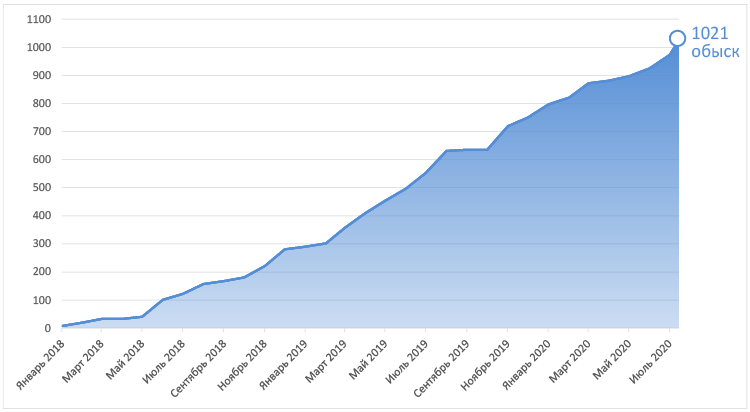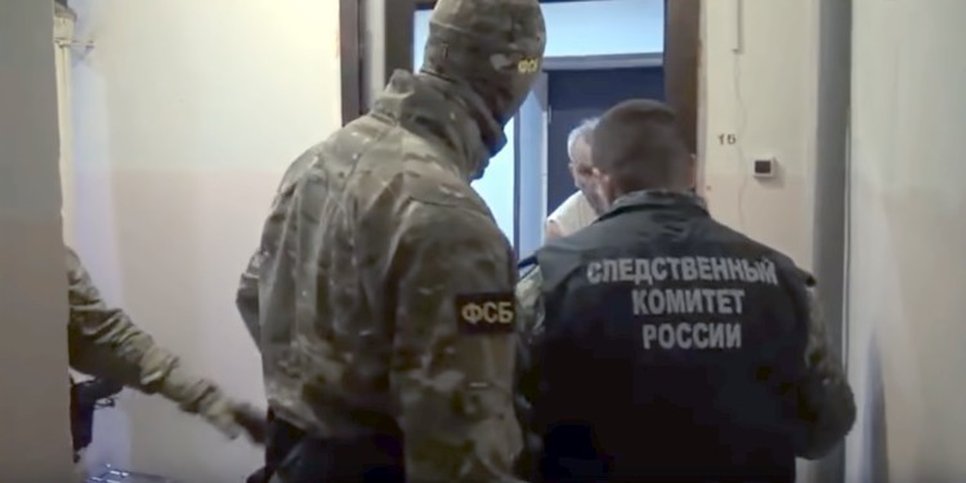Illustrative photo
Illustrative photo
Caution, the doors are about to be kicked in! The number of house searches of peaceful believers within three years reaches one thousand
MoscowThe number of searches of Jehovah's Witnesses in Russia continues to increase after the April 2017 Supreme Court decision. By mid-July 2020, more than 1000 home invasions of these law-abiding citizens had already been recorded. Law enforcement raids turn the lives of innocent people into a nightmare: separating families, destroying reputation, and causing physical and emotional trauma.
Special operations of law enforcers against peaceful believers are striking with their cruelty. Armed grabbing groups in masks break down doors and windows, breaking into harmless people. Not only men but also young children, defenseless women, the elderly, and the disabled are often the victims of exhausting, long hours of searches. Although Jehovah's Witnesses offer no resistance to the authorities, they are insulted, threatened, intimidated with assault rifles and tasers, beaten and even tortured.
As evidence in criminal cases, law enforcers confiscate Bibles, printed publications, electronic devices, as well as money, bank cards, personal notes, sewing and knitting magazines, "suspicious" napkins with beautiful illustrations and other things that have nothing to do with religion.
2018: "We are not in America"
The raids began with fan searches in winter 2018 in the Kemerovo and Belgorod regions. Special services treated peaceful workers as dangerous criminals. Armed detachments in masks broke down doors, crowded into dwellings, and forced harmless people to stand with their hands up against the wall for long periods, fell to the floor, releasing sarcastic remarks and offensive comments.
In a special operation code-named "Judgment Day" in Birobidzhan, about 150 law enforcement officers were involved in raids on 22 houses of believers. In Saratov, having come to the Bazhenov family with a search, the special forces by mistake cut the door to their neighbors and then broke their own. In Omsk law enforcers severely beat Sergey Polyakov and forced him to wipe his own blood off the floor. In Penza, the investigator forced six women to fully undress for a personal search.
On the night of November 15-16, 2018, one of the largest special operations against believers was carried out in a small Crimean town Dzhankoy. More than 200 FSB and police officers broke into at least 8 homes of local residents, kicking down doors. As a result of severe stress, 22-year-old Zhanna Lungu had a miscarriage. The young spouses had experienced the loss very badly. One of the Crimean believers had a microstroke due to the aggressive actions of the law enforcers.
Another distinguishing feature of the actions of the guards was a flagrant violation of procedures and disregard for the rights of citizens: the understood help special services to search andinterrogate residents, operatives do not let you get acquainted with the regulations and protocols of searches, threaten with problems at work and in educational institutions. In response to a request from a believer to make a legal call to a lawyer, the Kemerovo operative said: "We are not in America!"
2019: "It's unpleasant, but this is my job."
The number of searches of Jehovah's Witnesses in 2019 almost doubled, from 269 in 2018 to over 500. Special services did not ease the pressure on believers but acted more aggressively and cynically.
The infamous raid on the Surgut believers (KMAA-Yugra) turned into sophisticated torture with strangulation to the point of unconsciousness. In Minusinsk (Krasnoyarsk Territory), a Rosgvardiya officer pushed 76-year-old Aleksandr Potemkin, which caused the man to fall and get injured. In Evpatoria (Crimea), the search began late in the evening and continued almost a day, despite the poor health of believers. In Petrozavodsk (Karelia), the seizure groups came to people right at their workplaces and detained them on the street. In the Lipetsk region, FSB officers knocked down a housewife. She suffered a head injury and had to call an ambulance. In the Krasnoyarsk Territory, after the mass raids, the car of one of the believers was crushed with a sledgehammer.
During the raids law enforcers threw extremist literature into the homes of believers and immediately "found" it, adding it to the evidence in criminal cases. This happened in Novosibirsk, Nevinnomyssk (Stavropol Territory), Makhachkala, Kaluga, and other cities.
The enthusiasm of law enforcers in hunting "extremists" many times led to the fact that they came by mistake with searches even to people who were not Jehovah's Witnesses. In the town of Unecha (Bryansk region), in search of prohibited literature from relatives and friends of believers, law enforcement officers opened the floors. In the village of Nikolaevka (Krasnoyarsk territory), a 77-year-old woman experienced severe stress during a raid, the only reason for which was the religion of her grandson.
While storming an apartment in Sochi through a balcony, armed special forces placed both young and old people face to face on the floor, pointing machine guns at believers. During the search of the Martynov family, law enforcement officers planted a religious publication that did not belong to them. The law enforcers admitted that it was unpleasant for them themselves, but that was their job.
2020: "Armageddon has come for you!"
During the COVID-19 pandemic, Russian law enforcement continued to storm the houses of Jehovah's Witnesses, despite the regime of self-isolation. Searches in early 2020 became particularly aggressive and massive.
Approximately 100 Astrakhan law enforcement officers raided 20 families of local Jehovah's Witnesses. More than 30 investigative teams raided 50 houses of believers in the Transbaikalia. During the search in Chita, a teenager was beaten in front of his mother and younger sister. In Khabarovsk Territory, FSB officers invaded 68-year-old Yen Sen Li, hit him, broke his hands, fell to the floor, and handcuffed him. His wife lost consciousness as a result of such inhuman treatment of the elderly man.
In Ivanovo region, Primorye territory, Moscow region, and Tatarstan special services put believers at mortal risk of infection with coronavirus. In Teikovo (Ivanovo region), operatives in dirty boots flooded the apartment, inspecting everything up to plumbing and underwear. During the 7-hour search, a family of 5 people was allowed to visit the toilet only accompanied by security and sometimes with the door open.
During a raid in Kerch , Crimea, a 29-year-old father of young children was kept undressed in the cold for several hours, causing him to fall ill. His 4-year-old son cut his legs on the shards of broken windows. One of the security officials told the head of the family: "Armageddon has come for you! I will baptize you with 8 years of imprisonment. You'll cut down trees in the zone and sew uniforms for me."
"We're looking for anything to do with Jehovah."
The only reason for aggression and violence against peaceful believers in Russia is their faith in Jehovah God. The authorities motivate their decisions by the fact that "the activities of [Jehovah's Witnesses] are different from the traditional principles of Christianity". Russian law enforcement officials take conversations about God, Bible discussion, and prayer as extremism. According to the law enforcement officials themselves, they are looking for "everything connected with Jehovah": the Bible, cards, magnets.
For Jehovah's Witnesses in Russia - representatives of a religion known all over the world for its peacefulness - the house is no longer a "fortress." They no longer feel safe, can't sleep, wondering if a group of grabbers will break into their apartment shouting: "Everybody on the floor!
"You are so calm as if you were waiting for us"
At the same time, their strong faith serves as a source of support for Jehovah's Witnesses, and their prayers help keep them calm. Konstantin Moiseenko from Zeya (Amur region) said that during the search and interrogation, he and his wife felt extraordinary calm, so the senior FSB officer even remarked surprisingly: "You are so calm as if you were waiting for us". Later, a local church parishioner with knowledge of the situation told Konstantin, " The persecutors will never achieve their goal because persecution only strengthens the faith.”
There is a lot of support from fellow believers, and law enforcement officials themselves are well aware of that. Thus, during the search in the Krasnodar region, noting the confusion on the face of a believing woman, the investigator said: "Jehovah's Witnesses do not abandon theirs. Believe me, in a couple of days you will have instructions on how to act, what to say, and where to write.”
Aggressive actions of law enforcers have caused serious concern among Russian and international figures and organizations. The UN Working Group on Arbitrary Detention strongly condemned the violation of believers' rights and called these persecutions "systemic and institutionalized". Law scholars and human rights defenders both in Russia and abroad have unanimously condemned the actions of the authorities against Jehovah's Witnesses in Russia.

